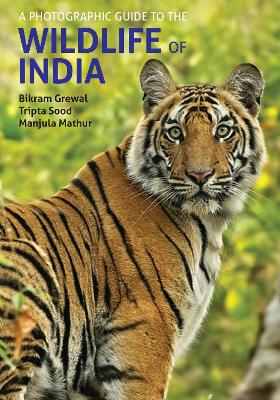Photographic Guide
1 total work
A Photographic Guide to the Wildlife of India is a wide ranging overview of the subcontinent's wildlife, describing and illustrating over 984 species from all 26 states, including the Andaman and Nicobar Islands.
The Indian region is exceptionally rich in wildlife due to its wide variety of habitats and climates. Altitude ranges from sea level to the peaks of the Himalaya; rainfall from its lowest in the Rajasthan desert to Cherapunji in Meghalaya, one of the wettest places in the world. This diversity supports a huge range of charismatic species from the iconic Bengal Tiger to Clouded Leopards, crocodiles to King Cobras, hornbills to eagles.
The guide begins with an overview of India's climate and geography, its wildlife habitats, threats to wildlife, extreme rarities and how to enjoy the forests. The main part of the book contains concise species descriptions of 678 birds, 114 mammals, 72 butterflies and other insects, 66 reptiles, and 54 trees and flowers; each one accompanied by a photograph. The book concludes with a section on wildlife watching in the national parks and wildlife sanctuaries which present the best chance of seeing many of these species described.
The Indian region is exceptionally rich in wildlife due to its wide variety of habitats and climates. Altitude ranges from sea level to the peaks of the Himalaya; rainfall from its lowest in the Rajasthan desert to Cherapunji in Meghalaya, one of the wettest places in the world. This diversity supports a huge range of charismatic species from the iconic Bengal Tiger to Clouded Leopards, crocodiles to King Cobras, hornbills to eagles.
The guide begins with an overview of India's climate and geography, its wildlife habitats, threats to wildlife, extreme rarities and how to enjoy the forests. The main part of the book contains concise species descriptions of 678 birds, 114 mammals, 72 butterflies and other insects, 66 reptiles, and 54 trees and flowers; each one accompanied by a photograph. The book concludes with a section on wildlife watching in the national parks and wildlife sanctuaries which present the best chance of seeing many of these species described.
